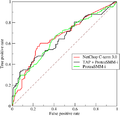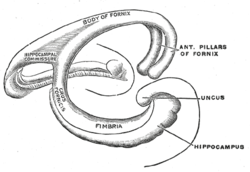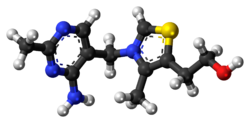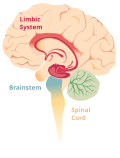Recognition memory, a subcategory of explicit memory, is the ability to recognize previously encountered events, objects, or people. When the previously...
76 KB (9,028 words) - 15:40, 9 March 2025
descriptions in memory. Stage 4 Semantic attributes are applied to the visual representation, providing meaning, and thereby recognition. Within these stages...
40 KB (5,293 words) - 00:02, 25 May 2025
reason about topics. Researchers distinguish between recognition and recall memory. Recognition memory tasks require individuals to indicate whether they...
138 KB (16,946 words) - 20:51, 17 June 2025
pattern recognition is a cognitive process that matches information from a stimulus with information retrieved from memory. Pattern recognition occurs...
35 KB (4,553 words) - 04:50, 26 May 2025
List of cognitive biases (redirect from List of memory biases)
(February 2011). "The list length effect in recognition memory: an analysis of potential confounds". Memory & Cognition. 39 (2): 348–63. doi:10.3758/s13421-010-0007-6...
110 KB (10,182 words) - 04:58, 17 June 2025
supporting poor facial recognition, something widely observed for M-LFA individuals. Implicit memory is non-declarative memory that relies on past experiences...
46 KB (5,829 words) - 07:08, 9 June 2025
and How We Can Change That. She studies visual perception, visual recognition memory, and mood (psychology). She is recognized for significant advancements...
8 KB (685 words) - 14:45, 9 June 2025
Déjà vu (category Memory)
associated déjà vu experiences with good memory functions, particularly long-term implicit memory. Recognition memory enables people to realize the event or...
38 KB (4,387 words) - 14:19, 6 June 2025
Face perception (redirect from Face pattern recognition)
theoretical "face recognition units" that are used with "personal identity nodes" to identify a person through information from semantic memory. Interestingly...
122 KB (14,549 words) - 01:24, 19 June 2025
Picture superiority effect (category Memory biases)
dual-process models, thought to underlie recognition memory is not clear. In experiments of associative recognition memory, participants studied random concrete...
23 KB (2,727 words) - 20:05, 17 December 2024
measures memory functioning. It evaluates both immediate, delayed and recognition memory ability along with the acquisition of new learning. The WRAML3 is...
2 KB (217 words) - 23:55, 12 February 2025
significant Recall (memory), the retrieval of events or information from the past Emotion recognition Pattern recognition (psychology) Recognition (sociology)...
4 KB (514 words) - 15:39, 16 November 2023
in episodic memory. The associated deficit is that differences in recognition memory reflect difficulty in binding components of a memory episode and...
45 KB (5,696 words) - 20:53, 17 June 2025
receiver-operating characteristic in recognition memory". Journal of Experimental Psychology: Learning, Memory, and Cognition. 25 (2): 500–513. doi:10...
62 KB (7,926 words) - 22:46, 28 May 2025
encoding depends on the context. This conclusion was drawn from a recognition-memory task. A series of psychological experiments were undertaken in the...
22 KB (2,905 words) - 01:23, 19 February 2024
Memory consolidation is a category of processes that stabilize a memory trace after its initial acquisition. A memory trace is a change in the nervous...
62 KB (7,382 words) - 08:53, 12 June 2025
types of tests: recognition memory tests and perceptual identification tests. These studies provided evidence that effects of memory on perceptual identification...
41 KB (5,584 words) - 19:04, 25 May 2025
Boundary extension (category Memory)
original picture. Boundary extension is typically studied using a recognition memory test where participants are shown a series of photos and then shown...
15 KB (2,052 words) - 16:56, 13 April 2024
it has been found to most closely correlate with recall memory rather than recognition memory. This means that damage to the fornix can cause difficulty...
11 KB (1,372 words) - 12:13, 24 May 2025
with a loss of smell. Odor recognition is the most common and direct means used to measure odor memory. In an odor recognition test participants are asked...
42 KB (5,327 words) - 05:15, 4 June 2025
Memory has the ability to encode, store and recall information. Memories give an organism the capability to learn and adapt from previous experiences as...
60 KB (8,695 words) - 20:37, 23 May 2025
The recognition failure of recallable words is an experimental phenomenon in cognitive psychology originally discovered by the memory researcher Endel...
4 KB (490 words) - 20:09, 14 July 2023
finding has been supported by studies of many explicit memory tasks such as free recall, recognition, cued-recall, and frequency estimation (for reviews...
28 KB (3,613 words) - 05:40, 17 June 2025
Wernicke–Korsakoff syndrome (category Memory disorders)
that assess perceptual priming. Other studies have shown deficits in recognition memory and stimulus-reward associative functions in patients with WKS. The...
38 KB (4,502 words) - 11:14, 8 June 2025
with massed items, leading to improved recall. Cued-memory tasks (for example, recognition memory, and frequency estimation tasks) rely more on item information...
26 KB (3,651 words) - 21:09, 25 May 2025
been removed, is a dysfunction of visual memory. In humans, areas specialized for visual object recognition in the ventral stream have a more inferior...
37 KB (4,564 words) - 20:54, 17 June 2025
also did not predict recognition memory. In this study, the importance of stimulus controls and experimental designs in research memory was highlighted. Arousal-related...
60 KB (7,087 words) - 04:09, 2 June 2025
False recognition can occur as the result of making an implicit associative response, an automatic association between two concepts in memory. It is...
43 KB (5,779 words) - 04:03, 12 June 2025
accessible to the decision maker, based on recognition retrieved from memory. This is possible if recognition of alternatives has relevance to the criterion...
25 KB (3,128 words) - 02:52, 27 January 2025
Reconstructive memory is a theory of memory recall, in which the act of remembering is influenced by various other cognitive processes including perception...
32 KB (4,054 words) - 00:33, 24 May 2025








